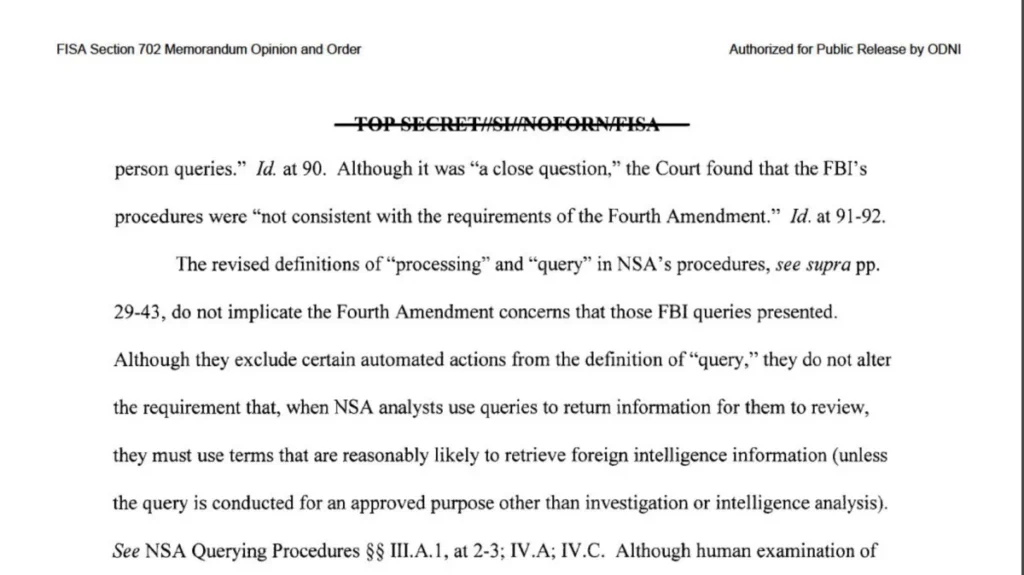Section 702 was misused against BLM protesters. It’s now quietly up for renewal

by TANDY LAU Amsterdam News Staff, Report for America Corps Member
New year, same Section 702 of the Foreign Intelligence Surveillance Act (FISA). The controversial provision permitting warrantless government searches abroad expires when the ball drops in Times Square at the end of the month, ushering in 2024. But another ball is in the court of Congress, which can renew or reform it.
In theory, Section 702 only greenlights surveillance of non-Americans overseas “expected to possess, receive or communicate foreign intelligence information.” American citizens anywhere in the world and residents in the United States regardless of nationality cannot be legally targeted.
But in practice, a database born out of Section 702 was misused more than 278,000 times, including by the FBI to search Black Lives Matter protesters, reported the Washington Post in May. And even within the guidelines, there’s a gray area due to communication between citizens and non-Americans, which critics say is often painted over with “overbroad” enforcement even as “reverse targeting,” the act of surveilling a foreign person with the purpose of gathering information on an American or person on U.S. soil is banned.
Six advocacy groups, including local organizations Surveillance Technology Oversight Project: S.T.O.P and the Neighborhood Defender Service of Harlem (NDS), penned a letter to Sen. Charles Schumer and Rep. Hakeem Jeffries, urging Democratic floor leaders to oppose reauthorization last Tuesday, Nov. 28 due to the history of misuse authorized via the provision.
“This is part of the post-9/11 surveillance expansion that Edward Snowden so memorably documented, which allowed the full collection of surveillance data on people all around the world,” said Albert Fox Cahn, S.T.O.P. founder and executive director. “It would be disturbing to have this power put in anyone’s hands for any purpose. The reality is that this has been rapidly abused against American citizens, despite so many broken promises that it would only be aimed overseas.”
Neither Schumer nor Jeffries responded to requests by press time.
The original FISA legislation was signed into law in 1978 by then-Pres. Jimmy Carter mandating non-criminal electronic surveillance only be authorized when “collecting foreign intelligence and/or foreign counterintelligence.” The United States Foreign Intelligence Surveillance Court (FISC) was also erected to handle warrants to surveil foreign agents.
Since then, amendments loosening and modernizing the law’s requirements include the post-9/11 USA Patriot Act and the Amendment Act of 2008, which created Section 702 and serve as the legal root to many surveillance programs leaked by the whistleblower Snowden.
NDS Harlem Managing Director Alice Fontier says while most cases Section 702 will impact are on the federal level and would largely not affect the organization’s work locally, the public defense service signed on due to concerns with transparency; most information, including the documents obtained by the Post, comes from declassified court documents. Even the little information provided publicly is frequently redacted in classic spy movie fashion.
“The problem with FISA as a whole is that it operates entirely in secret, applications are made in secret, the judges’ decisions are made in secret, and then everything is held in secret unless and until they want to use it against someone,” said Fontier. “But what we know for sure is that they are not limiting themselves to surveillance of foreign nationals and they use a very, very broad lens in determining what might be in support of any foreign interest that they are interested in knowing more about and surveilling.
“It was important to sign at any point in time, given the recent spate of protests calling for a ceasefire or in support of Palestine, and the fact that Hamas is the target of the Israeli government [and] a registered terrorist organization in the United States. It is almost certain that they [FISA] are going to be using these techniques and surveillance on a broad scope at this time in our communities. At any point I would have likely signed on but it feels urgent right now.”
She adds that these concerns are exacerbated locally by collaboration between intelligence agencies like the FBI and local law enforcement, namely the NYPD. While the initial FISA law dissuaded such joint efforts without ever officially mandating a ban, the imaginary “wall” prohibiting such information sharing was dissolved by the Patriot Act.
Fontier says she fears mass information about pro-Palestinian protest attendees can be handed over to police and subsequently chill New Yorkers’ right-to-protest. The NYPD did not respond to inquiries by press time.
The reauthorization talks coincide with the violence in Gaza. National Counterterrorism Center Director Christine Abizaid pointed to the Oct. 7 attacks as a reason for renewing Section 702 during a Senate hearing testimony roughly a month ago.
“Our country must preserve [counter-terrorism] fundamentals to ensure constant vigilance,” she said on Oct. 31. “Among these fundamentals is the intelligence collection enabled by Section 702 of the Foreign Intelligence Surveillance Act, which provides key indications and warnings on terrorist plans and intentions, supports international terrorist disruptions, enables critical intelligence support to, for instance, border security and gives us strategic insight into foreign terrorists and their networks overseas.”
Federal officials credit Section 702 for tools used to track down and kill former ISIS Minister of Finance Hajji Iman. The FBI points to the provision for successful queries undermining hacking efforts by Iran and the People’s Republic of China, along with disrupting kidnapping and assassination attempts by an unnamed foreign government.
An FBI spokesperson pointed to comments made by Director Christopher Wray on Tuesday, Dec. 5 at the most recent Senate Judiciary Committee. He argued the provision provided permissions for tools which “identify the intended target or build out the network of attackers so we can stop them before they strike and kill Americans.” Wray added that Section 702’s expiry would equate to “a form of unilateral disarmament” for the FBI.
The Director also maintained the reported misuse of Section 702-backed tools from the declassified documents “involve compliance errors” before the 2020 creation of the agency’s Office of Internal Auditing, which specifically handles FISA-related oversight. Recent FISC opinion say there’s currently a 98% compliance rate.
“We’re proud of the progress we’ve made, but we’re by no means done,” said Wray. “This is an ongoing effort, and we’re determined to work with Congress to get it right.”
While there’s certainly potential for international law concerns over a totally-compliant Section 702, Fourth Amendment rights protecting Americans and people on U.S. soil from unreasonable searches and seizures by the government do not apply to nonresident property on foreign soil.
The American Civil Liberties Union (ACLU) also publicly opposes Section 702’s reauthorization and suggests Congress reform the provision to narrow the “overbroad” specifics of who and what can be surveilled, along with improving oversight and transparency.
“The government itself admits that Section 702 has been abused to unlawfully conduct backdoor searches in ways that undermine civil rights, including to spy on Black Lives Matter activists protesting George Floyd’s murder at the hands of police,” said ACLU senior policy counsel Kia Hamadanchy over email. “This authority has been used to repeatedly violate the civil liberties of millions of Americans, and should not be reauthorized absent fundamental reform.”








